Introduction of IPC 325
IPC Section 325 deals with situations where someone intentionally causes serious injury to another person. If found guilty, the person responsible can be jailed for up to seven years and fined. This law aims to discourage harmful behavior and provide justice to those who suffer serious injuries.
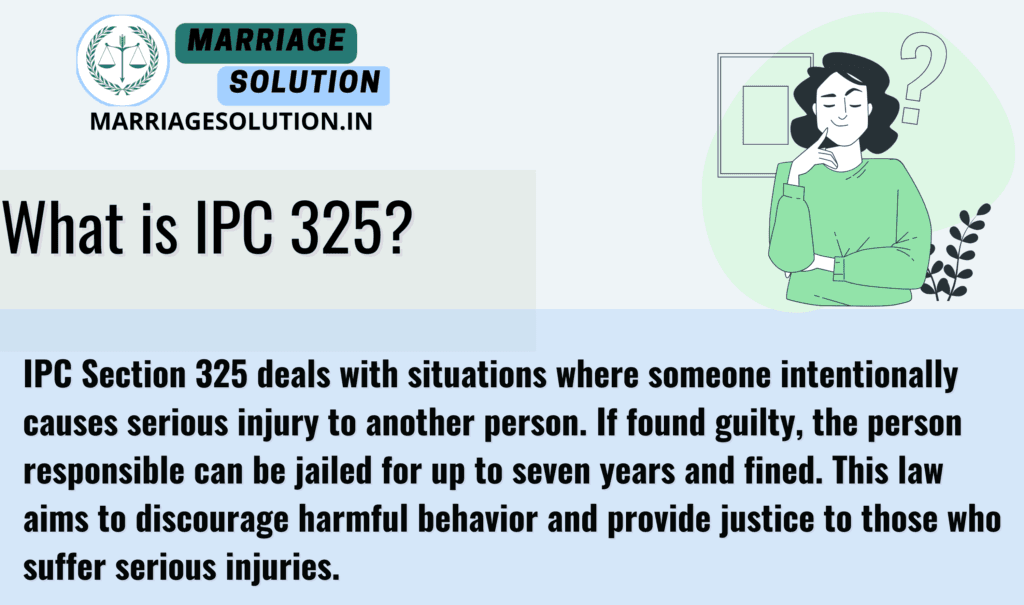
- Introduction of IPC 325
- What is IPC Section 325 ?
- Section 325 IPC
- IPC Section 325 Punishment
- Difference between hurt and grievous hurt
- 325 IPC bailable or not
- IPC 325 FAQs
- If you require assistance with court or any other Cases.
- Official website of the Maharashtra government’s police department for help and support.
What is IPC Section 325 ?
IPC Section 325 deals with cases in which a person deliberately inflicts severe injury on another individual. The legislation specifies that individuals found guilty of this crime can be incarcerated for up to seven years and may also face penalties. This provision aims to deter such harmful conduct while striving towards rendering justice for victims of grave bodily harm.
Section 325 IPC
1)Definition :
1) While grievous hurt is not explicitly defined within Section 325 itself, other sections, typically Section 326, provide examples While grievous hurt is not explicitly defined within Section 325 itself, other sections, typically Section 326, provide examples. These examples help understand the scope of grievous hurt.
2)Voluntarily Causing Hurt:
Similar to previous sections, causing hurt under IPC Section 325 must be a deliberate act. The offender must have intended to harm the victim intentionally.
3)Grievous Hurt:
Severity of Injuries: IPC Section 325 deals with more severe injuries compared to simple hurt (Section 323).Grievous hurt refers to injuries that are serious and cause significant harm to the victim
- Examples of Grievous Hurt:
- Permanent loss of sight or hearing: Injuries resulting in irreversible damage to vision or hearing.
- Privation of limbs or joints: Loss or impairment of limbs or joints, leading to disability.
- Fracture or dislocation of bones: Severe bone injuries causing fractures or dislocations.
- Any hurt endangering life or causing severe pain: Injuries that pose a significant risk to life or cause intense and prolonged pain.
What is IPC 325? IPC Section 325, titled “Voluntarily causing grievous hurt,” addresses the intentional act of inflicting grievous bodily harm or injury on another person using weapons, such as firearms, sharp instruments, or other dangerous means. This offense is considered a grave crime and is punishable under the law.
Key Points:
- Voluntary Act: The offense under IPC Section 325 involves the voluntary or intentional infliction of grievous hurt, as opposed to accidental or unintentional harm.
- Use of Weapons or Dangerous Means: The distinguishing factor in IPC Section 325 is the use of weapons, such as firearms, sharp instruments, or other dangerous means, to cause grievous hurt.
- Definition of Grievous Hurt: The term “grievous hurt” is defined in IPC Section 320, which outlines various types of injuries that are considered grievous, such as fractures, permanent disfigurement, or the loss or impairment of any organ or limb.
IPC Section 325 Punishment
1)Offense Description:
– IPC Section 325 addresses situations where someone intentionally causes severe harm to another person. This harm is termed as “grievous hurt” and includes injuries like permanent disfigurement or loss of limb function.
2)Punishment Provision:
– Under IPC Section 325, if someone is found guilty of causing grievous hurt, they can be sentenced to imprisonment for a maximum of seven years. Depending on the magnitude of harm caused, a fine may also be levied by the court upon the perpetrator.
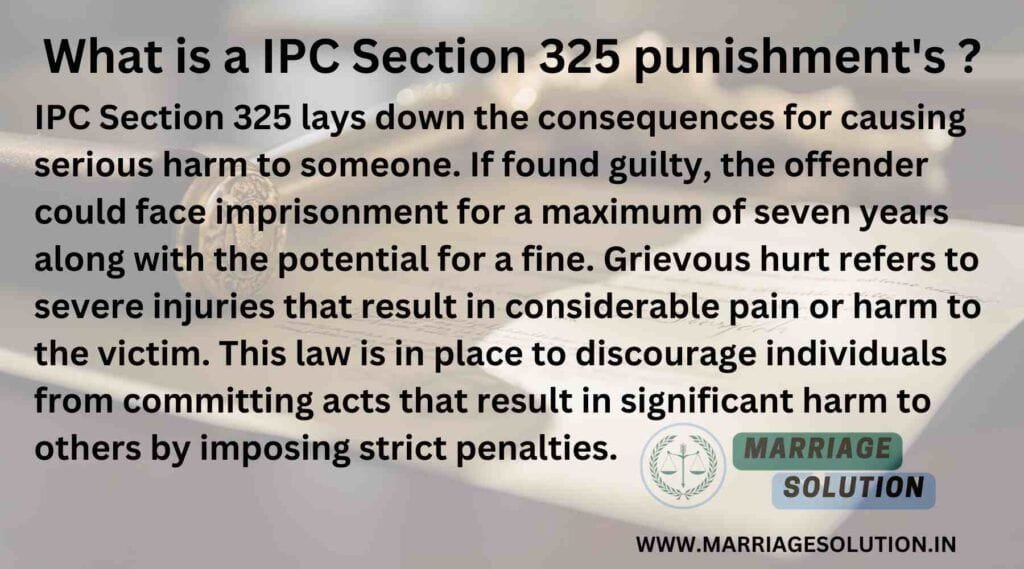
Difference between hurt and grievous hurt
Difference between hurt and grievous hurt
| Point | Hurt | Grievous Hurt |
|---|---|---|
| Definition | Any bodily injury causing pain or damage | Severe injuries causing significant harm or impairment |
| Severity | Generally minor | Severe and potentially life-altering |
| Examples | Bruises, scratches, superficial cuts | Permanent disfigurement, loss of limb function, injuries endangering life |
| Consequences | Mild pain or discomfort | Profound physical, emotional, and permanent consequences |
| Treatment | Often requires minimal medical intervention | Often requires extensive medical treatment and rehabilitation |
| Legal Implication | May result in lesser legal consequences | May result in more serious legal consequences, including higher penalties |
325 IPC bailable or not
An offense under IPC Section 325 is considered a non-bailable offense, meaning that the accused cannot be released on bail as a matter of right. The decision to grant bail lies within the discretion of the court.
IPC 325 FAQs
What is the difference between IPC 322 and IPC 325?
IPC Section 322 deals with voluntarily causing grievous hurt, while IPC Section 325 addresses the offense of voluntarily causing grievous hurt with the use of weapons or other dangerous means. The punishment under Section 325 is more severe due to the use of weapons or other means.
Is it necessary for the victim to sustain permanent injuries for an offense under IPC 325 to be established?
No, it is not necessary for the victim to sustain permanent injuries for an offense under IPC Section 325 to be established. As long as the injury falls within the definition of “grievous hurt” outlined in IPC Section 320, and the act was voluntary and involved the use of weapons or dangerous means, the offense can be established.
If you require assistance with court or any other Cases.
Court or any other marriage-related issues, our https://marriagesolution.in/lawyer-help-1/ website may prove helpful. By completing our enquiry form and submitting it online, we can provide customized guidance to navigate through the process effectively. Don’t hesitate to contact us for personalized solutions; we are here to assist you whenever necessary.
Official website of the Maharashtra government’s police department for help and support.
https://www.mahapolice.gov.in/ visit the official website of the Maharashtra government for any requirements or inquiries.
- AFSPA Act
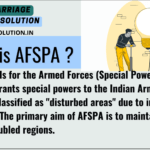 AFSPA act mean Armed Forces Special Powers Act (AFSPA) grants special powers to the Indian Armed Forces in areas classified as “disturbed” due to significant insurgency or internal disturbances.
AFSPA act mean Armed Forces Special Powers Act (AFSPA) grants special powers to the Indian Armed Forces in areas classified as “disturbed” due to significant insurgency or internal disturbances. - Right to Information RTI act :Your Comprehensive Guide (Part 1)
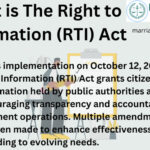 The Right to Information (RTI) Act : Explore the essence of the Right to Information (RTI) Act through this symbolic image. The image features legal documents, emphasizing the importance of transparency and accountability in governance. The scales of justice represent the balance achieved through the citizens’ right to access information.
The Right to Information (RTI) Act : Explore the essence of the Right to Information (RTI) Act through this symbolic image. The image features legal documents, emphasizing the importance of transparency and accountability in governance. The scales of justice represent the balance achieved through the citizens’ right to access information. - What is Article 371 of Indian Constitution ?Article 371 of the Indian Constitution grants special provisions to specific states and regions within India, addressing their unique historical, social, and cultural circumstances. These provisions aim to accommodate diverse needs and protect cultural identities within the constitutional framework.
- Indian Labour law : Your Comprehensive Guide (Part 1)
 The purpose of labour laws is to safeguard employees and guarantee equitable treatment at the workplace, encompassing aspects such as remuneration, security, and perks. These regulations establish a secure ambiance by imposing minimum wage requirements, ensuring factory safety measures are implemented effectively while granting rights like maternal leave entitlements. Abiding by these principles promulgates an impartial work culture encapsulating upright conduct; thereby cultivating conducive surroundings for progressive development.
The purpose of labour laws is to safeguard employees and guarantee equitable treatment at the workplace, encompassing aspects such as remuneration, security, and perks. These regulations establish a secure ambiance by imposing minimum wage requirements, ensuring factory safety measures are implemented effectively while granting rights like maternal leave entitlements. Abiding by these principles promulgates an impartial work culture encapsulating upright conduct; thereby cultivating conducive surroundings for progressive development. - GST :Your Comprehensive Guide (Part 1 – Understanding the Basics)
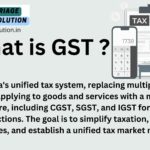 The Goods and Services Tax (GST) is like a big change in how we pay taxes in India. It started on July 1, 2017, and it’s here to simplify things. Before GST, we had many different taxes, and it could get confusing. Now, with GST, it’s like combining all those taxes into one. The idea is to make taxes more straightforward, clear, and fair for everyone. It applies to almost everything we buy or sell, and it’s helping India’s businesses and economy work better together. So, GST is not just a tax change; it’s a step towards making things simpler and better for all of us.
The Goods and Services Tax (GST) is like a big change in how we pay taxes in India. It started on July 1, 2017, and it’s here to simplify things. Before GST, we had many different taxes, and it could get confusing. Now, with GST, it’s like combining all those taxes into one. The idea is to make taxes more straightforward, clear, and fair for everyone. It applies to almost everything we buy or sell, and it’s helping India’s businesses and economy work better together. So, GST is not just a tax change; it’s a step towards making things simpler and better for all of us.
